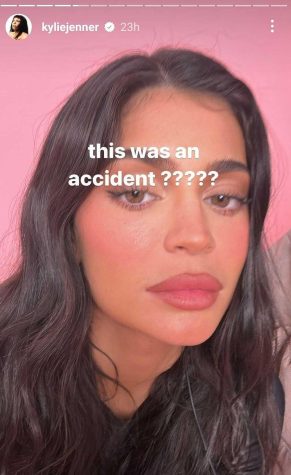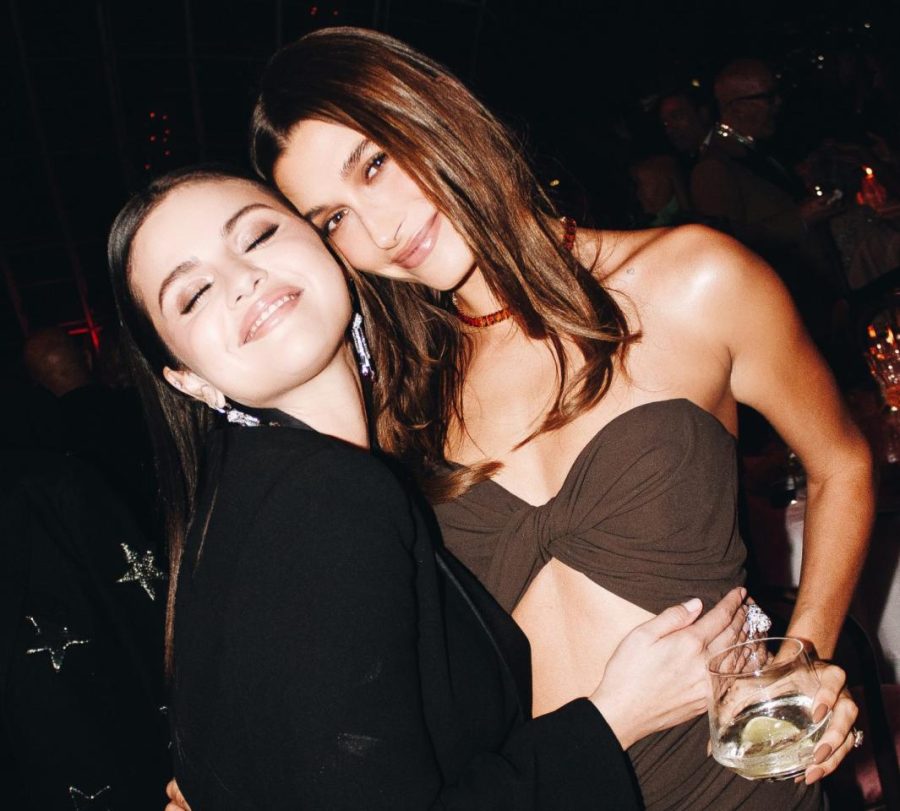Selena Gomez, Hailey Bieber, and The Price of Parasocial Relationships
It may be time to stop letting millionaire celebrities live rent free inside your head.
PHOTO | Tyrell Hampton via Entertainment Weekly
Selena Gomez and Hailey Bieber pose for a photo together at the Academy Museum Gala in Los Angeles on Oct. 15, 2022, seemingly indicating that there is no bad blood between them.
If you’re a person who has a social media account or even a remote interest in pop culture, then you, like me, have probably seen something about the apparent re-ignition of Selena Gomez and Hailey Bieber’s so-called feud.
The latest bout of internet drama arose after Gomez, who dated Bieber’s husband, Justin Bieber, on-and-off from 2010 to 2018, posted a TikTok video on February 22, joking about having accidentally over-laminated her eyebrows. Hours later, Bieber’s friend Kylie Jenner shared a photo of herself on her Instagram story, with text over her eyebrow, reading, “This was an accident???” This was followed up with a screenshot of a Facetime call between herself and Bieber, who married Justin in 2018, in which both women are zoomed in on their eyebrows.

Fans immediately jumped to the conclusion that Jenner’s story was intended to throw shade at Gomez. Many took to social media to express their support for Gomez, while others took aim at Bieber, calling her “talentless” and “jealous,” and even creating posts comparing Justin’s relationship with Bieber to his relationship with Gomez, offering them as evidence that Bieber’s husband does not actually “love” her, according to Glamour.
In the wake of eyebrow-gate, Gomez has gained 16 million followers on Instagram, surpassing Jenner to become the most followed woman on the platform, according to Insider. Jenner, meanwhile, has lost around 500,000 followers, and Bieber over 1 million.
I’m not going to waste time recapping and scrutinizing Gomez and Bieber’s entire long and messy history. There are already an abundance of articles online dedicated to overanalyzing and somehow linking the two women’s every actions, and I’m really not interested in contributing to that speculative dumpster fire, especially since it is so clearly rooted in our culture’s misogynistic need to disempower successful women by reducing them to their romantic relationships and pitting them against one another.
What I am interested in looking at, however, is what causes the public to react so strongly in scenarios like these. It’s not as if Gomez or Bieber are people that we know personally or as if the outcome of their conflicts will impact our lives in any way. So then why is it that we become so absorbed in the feuds of celebrities? Why do we feel so compelled to choose a side and defend it passionately if ever the subject arises in conversations with friends?
Is there anything more iconic than Selena Gomez becoming the most-followed woman on Instagram and then promptly taking a short social media break? No. https://t.co/kwmIcvFD3M
— Vogue Magazine (@voguemagazine) March 8, 2023
The answer is a term that has become increasingly popular on the internet over the last few years: parasocial relationships. A parasocial relationship is defined as when a viewer or audience member becomes attached to or invested in a media character, either real or fictional, who doesn’t return the emotion and likely does not know that the individual exists, according to Refinery29.
“Much of the time we don’t really notice [parasocial relationships] because they’re so natural, and then we find ourselves having a discussion with a stranger about someone neither of us has actually met but who we know intimately. Or feel that we know intimately. Which isn’t really that different,” Dr. David Giles, who researches media psychology at the University of Winchester, said in an interview with Refinery.
Many experts agree that parasocial relationships can actually be psychologically healthy and beneficial, according to Insider. As human beings, we are wired to form social connections, so when we encounter figures through the media, we seek to develop a bond with them. Parasocial relationships have the potential to increase your confidence, inspire you to improve yourself or make you feel less isolated.
A 2022 study published by the American Psychological Foundation found that the number of parasocial relationships actually increased during the pandemic as a result of people’s increased reliance on them for a sense of comfort and companionship when distanced from real-life friends and loved ones.
However, parasocial relationships do have the potential to lead to great harm as well, a fact which has been clearly demonstrated by many fans’ responses to the Gomez-Bieber conflict.
For some of those fans who feel a strong connection to Selena Gomez, this response has taken the form of leaving hateful comments under Bieber’s posts and making mocking videos of her. The hostility has even made its way offline – after Bieber’s husband Justin Bieber performed at the Rolling Loud Festival on March 4, members of the crowd chanted “F–k Hailey,” according to Insider.
Fans of Gomez and Bieber not only direct their negative comments at the opposing artists, but also at their fans. The hashtag #teamselena has 750 million views on TikTok, while the hashtag #teamhailey has 57 million, according to Forbes. In the comment sections on many of these posts, users harass and argue with one another to defend their chosen side.
It is clear from this behavior that some fans need to take a step back and assess. As close as you may feel to a certain celebrity, they are still only humans, and the parts of their lives and personas that we have access to are carefully curated to present a particular image.
Before reacting, fans should take a deep breath and ask themselves if it’s truly worth it to get worked up over the issues of a person that they don’t really know. There are so many other things to direct your energy towards besides lashing out at others online. In the wise words of Selena Gomez, it’s better to “kill ‘em with kindness”.



